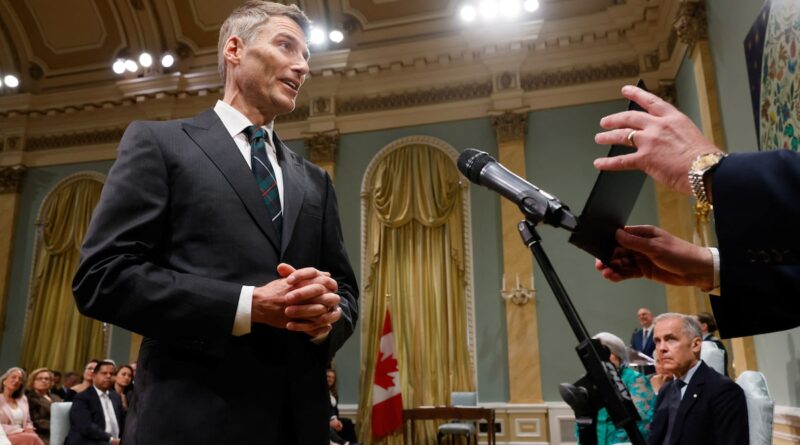Former Vancouver mayor whose housing policies were controversial now federal housing minister
Gregor Robertson attends a swearing-in ceremony to become Canada’s Minister of Housing and Infrastructure and Minister responsible for Pacific Economic Development Canada during a cabinet shuffle at Rideau Hall, in Ottawa, Ont, on May 13.Blair Gable/Reuters
Gregor Robertson, Canada‘s new housing minister, is a former Vancouver mayor blamed by some for presiding over a period of skyrocketing housing prices, but credited by others for bringing in precedent-setting policies aimed at tackling an affordability problem that has persisted since the 1990s.
Mr. Robertson, who was appointed to Prime Minister Mark Carney’s new cabinet on Tuesday, had a mixed record as mayor. Notably, he never managed to deliver on his promise to end street homelessness – though its rate of increase slowed while he was in office, and he did persuade the province to fund shelters that ran for the entire winter season, rather than only on cold or rainy winter days.
Now, his critics and admirers are watching with interest to see how the bike-riding, environmentalist former mayor will handle a portfolio centred on a housing affordability crisis he once struggled to get higher levels of government to regard as more than a Vancouver-only issue.
“I hope he sees the flaws of the system,” said Rick Ilich, chair of the B.C.-based Urban Development Institute and CEO of Townline Homes Inc.
Mr. Ilich, like others in development, appreciates the business-oriented approach of Mr. Robertson, who co-founded the Happy Planet juice company before he entered politics in 2005.
Mr. Robertson served as an NDP MLA from 2005 until 2008, and then won three municipal elections. He served as mayor for 10 years.
After leaving the mayor‘s office in 2018, he worked for a private sustainable-development company, Nexii, but left in late 2023 after the company ran into financial problems.
“He’s actually a level-headed guy, measured in his approach. I suggest we might have an ally in getting through to government,” Mr. Ilich said, referring to the housing development industry.
Randy Helten, a blogger and one of the mayor‘s most persistent critics, also hopes that Mr. Robertson has learned some lessons from his years enmeshed in the housing crisis.
“My only hope is that he’s a changed man,” Mr. Helten said.
Mr. Helten launched his blog, CityHallWatch, shortly after Mr. Robertson and his Vision Vancouver party initiated a new policy to encourage developers reeling from the 2008 housing collapse to switch over to building rental homes for the first time in decades.
Using fee reductions and density bonuses as incentives, the STIR (Short-Term Incentives for Rental) program resulted in some new projects – and a huge uproar from some residents, including Mr. Helten, who believed developers were getting too much for too little affordable housing.
“He started off good, but with the global financial crisis I think he panicked and I think he was influenced by his donors,” Mr. Helten said.
Vision Vancouver was unusually successful during its three election campaigns in raising money from developers, and also unions and left-wing supporters.
In his last term, Mr. Robertson initiated a policy to award even greater density bonuses to developers who agreed to keep a certain percentage of the units in new buildings at below-market rents. And he announced a plan to build 1,000 social-housing units on seven different pieces of city-owned land.
Three of those seven have only just started construction, while one is still sitting undeveloped.
Stepan Vdovine, a vice-president at Amacon Developments and former president of the mayor‘s political party, said Mr. Robertson struggled to come up with housing solutions at a time when both the provincial and federal governments weren’t that interested in what was viewed as a uniquely bad housing situation in Vancouver.
He believes Mr. Robertson and Mr. Carney will make an excellent team because they both favour a pragmatic, business approach.
“He’s not made for bureaucratic process. He wants action,” Mr. Vdovine said.
But others in the development community worry that Mr. Robertson will try to attach too many environmental objectives – energy efficiency and water recycling, for example – to housing-support programs. They believe the pursuit of these goals has led to some of the current issues with unaffordability.
“All the new environmental costs, we’re getting into $55,000 to $60,000 per home on that policy alone,” Mr. Ilich said.
Chris Gardner, chief executive officer of the non-union Independent Contractors and Businesses Association, said he is concerned Mr. Robertson will carry on with policies that he said were flawed then and are still flawed.
“He said he would end homelessness and homelessness got worse, the streets got worse,” Mr. Gardner added.

